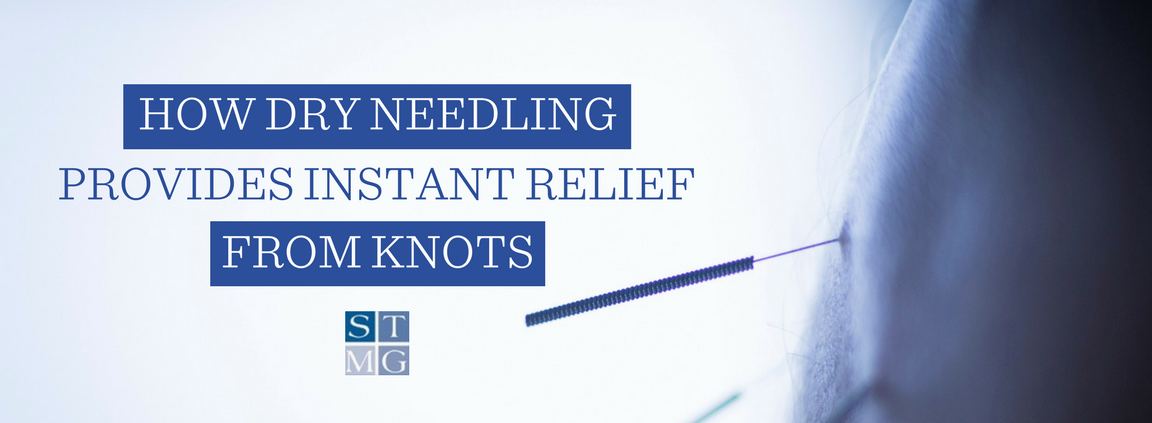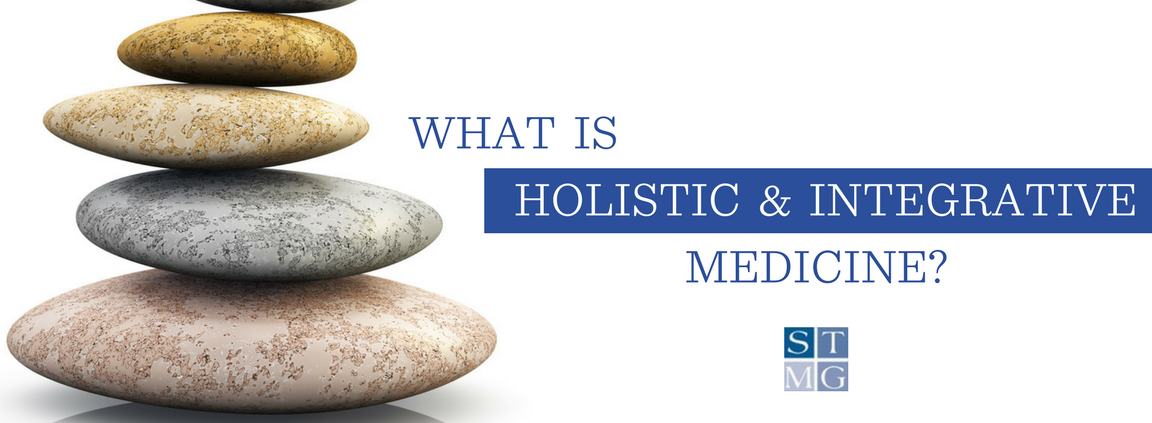How Dry Needling Provides Instant Relief from Knots
/in Uncategorized/by Nicole ClawsonWe all get painful muscle knots from time to time. And whether you’ve tried professional massage therapy or simply rolled your back with a tennis ball, you know how difficult it can be to ease an irritating knot. Once a knot develops, it can be very difficult to get rid of! Severe knots may even detract from your quality of sleep or cause you to avoid certain types of physical activity, resulting in further secondary problems like fatigue and weight gain.
Fortunately, many people are now finding relief from muscle knots through dry needle therapy. Dry needle therapy essentially “wakes up” muscle knots. Once startled, these knots relax back into their natural state.
How Does Dry Needle Therapy Work?
To understand how the therapy works, it’s helpful to know a little bit about muscle knots (also known as “myofascial trigger points”). Muscle knots are contracted fibers that have seized up as a result of some form of trauma (e.g. sports injury, car accident), posture, or overstimulation (e.g. weightlifting).
There are two types of knots:
- Active Knots: Producing intense pain.
- Latent Knots: Only painful when pressed on.
Dry needle therapy resolves muscle knots by inserting a very thin needle directly into the trigger point. The knot responds to the interruption and relaxes immediately. Most patients agree that dry needling doesn’t hurt in the way that you might think! Instead you might notice a little bit of pressure followed by release.
Not only does dry needle therapy reduce pain by resolving muscle knots; undergoing this therapy also means you can return to regular physical activity – no longer hindered by painful knots and trigger points. By dealing with the knots now you’re taking preventative measures against more complex health issues later on down the road.
What Do I Need In Order to See a Physical Therapist?
In Tennessee, patients have the privilege of direct access to physical therapists. Tennessee state law does not require patients to obtain a physician referral for physical therapy. This is a unique privilege in Tennessee that’s not available in all states.
St. Thomas Medical Group is proud to partner with Results Physiotherapy in Nashville for dry needle therapy. Keep in mind, dry needle therapy isn’t just for treating injuries. Dry needle therapy is a part of many patients’ preventative health care strategies. The technique may help prevent the need for more invasive treatments, like surgery, later on.
Find a Physical Therapist or Primary Care Provider in Nashville
For more information about dry needle therapy, visit our partners, Results Physiotherapy. To find a primary care provider near you in Nashville, call St. Thomas Medical Group Department of Children and Adults at +1 (615) 301-7040. You can also make an appointment online.
What Is Holistic & Integrative Medicine?
/in Uncategorized/by Nicole ClawsonFrom choosing better foods to exercising more, many Nashvillians are joining a growing movement focused on improving overall health. Holistic doctors at Nashville’s St. Thomas Medical Group are here to support you in this journey.
While many modern health care providers rely heavily on prescription medications for treating disease and illness, holistic and integrative medicine providers tend to put a greater emphasis on lifestyle modification, herbal and nutritional therapies and cognitive therapies. Additionally, holistic doctors in our Nashville clinic take a proactive stance in promoting overall wellness. Providers don’t just respond to disease. They help patients achieve optimal health as a disease prevention strategy. As St. Thomas Medical Group provider Dr. Joseph Lamb says, “Health is so much more than the simple absence of disease.”
#1 Lifestyle Modification
Holistic medicine practitioners frequently encourage patients to make lifestyle changes in an effort to promote healing. Instead of prescribing a sleeping pill, for example, a holistic doctor may recommend specific dietary changes or exercise routines. Rather than prescribing phentermine for weight loss, a holistic physician may carefully evaluate your current diet and recommend manageable modifications that can lead to weight loss without prescription drugs (and their potentially dangerous side effects).
#2 Herbal & Nutritional Therapy
Many holistic physicians are knowledgeable about herbal and nutritional therapies that are less commonly used by internal medicine doctors. These methods, which draw on a rich history of traditional medicine, may be used in conjunction with modern medicinal practices to help patients achieve wellness.
#3 Cognitive Therapy
Thirdly, holistic providers in Nashville’s St. Thomas Medical Group may use cognitive-behavioral therapy to help patients deal with psychological issues, such as depression, eating disorders, drug addiction and substance abuse. Because holistic doctors view patients as “whole” (not people with isolated symptoms and illnesses within the body), these providers use evidence-based approaches to involve a patient’s way-of-thinking in caring for their joint mental and physical health needs.
Your Health Matters…
While holistic and integrative physicians use techniques that are not commonly seen in your “normal” doctor’s office, these physicians are still able to prescribe medications, refer patients for surgery, and provide all of the other health care services that patients may expect of a primary care physician. The benefit of seeing a holistic doctor is that patients have the ability to choose less invasive, more natural therapies first.
As Dr. Lamb says, “In our journey together, through illness and disease to optimal wellness, lifestyle modification can be a most potent opportunity for achieving the patient’s goals.” This prioritization of non-drug-based therapies doesn’t isolate individual illnesses and care plans, but instead incorporates the patient’s entire health into a single, unified plan of care. This approach can be useful for patients dealing with complex health issues like…
- Cardiometabolic disorders
- Diabetes
- Obesity
- Osteoporosis
- Autoimmune disorders
- Chronic fatigue
- Fibromyalgia
- …and more
Take Charge of Your Health With a Holistic Doctor in Nashville
St. Thomas Medical Group Holistic & Integrative Medicine is committed to helping you take charge of your health through lifestyle modification and other methods that take your overall health into account. For more information or to schedule an appointment, call +1 (615) 297-2700.
How to Choose a New Primary Care Doctor
/in Uncategorized/by Nicole ClawsonDid you know that only 43% of millennials say they would go to a primary care provider (PCP) for non-emergency treatment? Instead of receiving routine preventative care, the majority of millennials are seeking out care on an as-needed basis, turning to walk-in clinics or emergency rooms when health issues arise.
While walk-in clinics are excellent resources for the quick diagnosis and treatment of ailments like cough, flu, and strep throat, these establishments were never intended to function as the primary source of health care for patients.
Walk-in clinics and emergency care facilities are designed to provide immediate care for specific, isolated health issues. They are not designed to provide holistic and preventative care that’s based on a patient’s unique personal and family medical history.
Patients Without a Primary Care Provider Are at a Disadvantage.
One of the primary benefits of having a primary care provider is that you have a health advocate – someone who knows your medical history and is able to provide care that takes your entire well-being into account. Patients who don’t have a PCP are doing themselves a disservice!
How to Find a Primary Care Provider…
Your health insurance plan may provide you with a list of physicians and practices that offer in-network primary care. Within this list, you could have dozens or even hundreds of choices. How do you narrow down your search to find the primary care doctor that’s right for you?
- Consider your family’s needs. If you have children, you may prefer to see a family practitioner who can accommodate all of your family’s health care needs, reducing the number of visits you have to make for annual exams and other needs. If you don’t have children and only need to consider your own health care needs, you may opt for an internal medicine provider.
- Visit the office and meet the physician. An in-person consultation is the best way to get to know a PCP. You should feel comfortable and respected in your physician’s office. Do the health care providers listen to you? Do they make an effort to provide care that aligns with your desires and preferences? Can you easily see your physician if you become sick, or is it only possible to see your doctor by scheduling months in advance?
- Consider location. “Location, location, location,” as the realtors say. Your PCP should be easy to access – one reason why we’ve made our home at the intersection of Green Hills, Sylvan Park and Belle Meade.
- Seek referrals. Talk to friends, family, co-workers, and other health specialists you may already be seeing. Take advantage of your personal network and seek advice from those whose opinion you respect!
- Consider hospital access. For some patients, it’s important that a primary care provider has privileges at certain local hospitals. Seeing a physician that has a good working relationship with your hospital of choice can be a tremendous benefit should you require care in the hospital setting.
Find a Primary Care Provider in Nashville
To find a primary care provider near you in Nashville, call St. Thomas Medical Group Department of Children and Adults at +1 (615) 301-7040. You can also make an appointment online.




